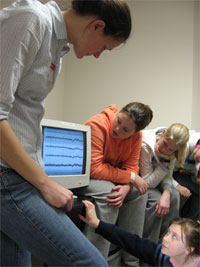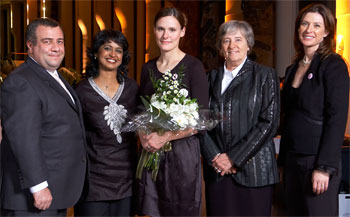 |
| At the inaugural meeting of SuperNOVA's girls' science club, Erin Mazerolle explains how neuroscientists measure electrical brain waves to learn about the human brain. (Photo courtesy Erin Mazerolle) |
When Erin Mazerolle talks about a club for girls she started with SuperNOVA, her voice gets animated. You just know she feels passionately about it.
“We want to make learning science more of an adventure,” she says, on the phone from Ottawa, where she was awarded a 2007 L’Oréal Canada – UNESCO Mentor Fellowship Award at an event held at the Canadian Museum of Civilization. “We have a lot of fun with the science clubs; we’ve tried to create an environment where girls can learn and explore and experiment. They’re able to picture themselves as scientists.”
SuperNOVA is a student-run, non-profit organization with a mandate to promote science, engineering, and technology to youth across Nova Scotia. In January 2006, as a member of Actua, a national network reaching over 240,000 youth nationwide, and with the support of the Canadian Women’s Foundation, SuperNOVA launched an all-girls science club to encourage girls to participate in science and engineering.
“The transition from student to scientist becomes easier if someone has already forged the path,” says Ms. Mazerolle, 24, who is soon to begin her Phd at Dalhousie University. “That’s what the club is all about; it introduces the girls to women scientists and gives them a sense of their work. I really believe we need good female role models and that’s one of the reasons it’s good to give back,” she says.
While the total number of women attending Canadian universities has increased, women nevertheless represent only 16 per cent of faculty members in the natural sciences and engineering disciplines, according to the Natural Sciences and Engineering Research Council of Canada (NSERC). Moreover, representation by women decreases the further you go up the academic ladder; women account for 23 per cent of assistant professors beginning a career but just nine per cent of full professors.
Long undecided about her own career choice, Ms. Mazerolle began her undergraduate degree in the Dalhousie Integrated Science Program, exploring a range of scientific disciplines through field trips, lectures and lab work. After her first year, she secured a NSERC undergraduate research award and got a summer job in the psychology department studying brain waves. That’s when she got hooked.
“It was my first research job: it was very hands-on and I’m still doing related work,” she says.
Her research still involves the human brain, not so much its grey matter, but the white matter. That’s the brain’s connective tissue which contains nerve fibers and is sheathed in a white fatty insulating protein called myelin. The white matter is almost like the highways of your brain,” she explains. “In essence, we generally think of gray matter as where most of the processing takes place, whereas the white matter provides the channels of communication.”
 |
| Javier San Juan, President & CEO of L’Oréal Canada, Ameenah Gurib-Fakim, Laureate of the 2007 L’Oréal-UNESCO For Women in Science Award for Africa, Erin Mazerolle, laureate of the L’Oréal Canada For Women in Science Mentor Fellowship, Michèle S. Jean, President of the Canadian Commission for UNESCO, and Jennifer Flanagan, President and CEO of ACTUA at the ceremony honoring the Fellows of the For Women in Science Program at the Canadian Museum of Civilization. |
The Dartmouth resident will conduct her doctoral research at the Institute for Biodiagnostics (Atlantic), a state-of-the-art brain imaging facility in Halifax. Her research, which uses functional magnetic resonance imaging (fMRI), is looking at whether fMRI can be used to study white matter. Eventually, her work may have applications to our understanding of brain diseases such as multiple sclerosis. In people affected by MS, patches of damage called lesions appear in the white matter of the brain and spinal cord.
But even as she’s about to embark on demanding doctoral studies, she’s eager to continue her mentoring work. The $5,000 Fellowship will allow her to do that; it was one of four awards given to doctoral students and post-doctoral fellows through a “For Women in Science” partnership between L’Oréal Canada and the Canadian Commission for UNESCO. The partnership aims to promote and support the contributions of women to scientific fields.
Sandrine Michard, L’Oréal Canada’s Vice-President for corporate communications, says her company is proud to support the mentorship fellowships. L’Oréal depends on its research to develop new and safe products, and devotes four per cent of its budget to supporting 27 different laboratories throughout the world.
“The mentor fellowships are so important,” says Ms. Michard. “We need people who are still young and in their early stages of their careers to talk to girls about science. Girls can relate to them and they will make science very fun.”
